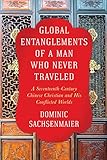Global Entanglements of a Man Who Never Traveled : A Seventeenth-Century Chinese Christian and His Conflicted Worlds / Dominic Sachsenmaier.
Material type: TextSeries: Columbia Studies in International and Global HistoryPublisher: New York, NY : Columbia University Press, [2018]Copyright date: ©2018Description: 1 online resourceContent type:
TextSeries: Columbia Studies in International and Global HistoryPublisher: New York, NY : Columbia University Press, [2018]Copyright date: ©2018Description: 1 online resourceContent type: - 9780231187527
- 9780231547314
- 951/.032092 B 23
- CT3990.Z579
- CT3990.Z579 S23 2018
- online - DeGruyter
- Issued also in print.
| Item type | Current library | Call number | URL | Status | Notes | Barcode | |
|---|---|---|---|---|---|---|---|
 eBook
eBook
|
Biblioteca "Angelicum" Pont. Univ. S.Tommaso d'Aquino Nuvola online | online - DeGruyter (Browse shelf(Opens below)) | Online access | Not for loan (Accesso limitato) | Accesso per gli utenti autorizzati / Access for authorized users | (dgr)9780231547314 |
Frontmatter -- Contents -- Acknowledgments -- Introduction: Situating Zhu Zongyuan -- 1. A Local Life and Its Global Contexts -- 2. A Globalizing Organization and Chinese Christian Life -- 3. A Teaching Shaped by Constraints -- 4. Foreign Learnings and Confucian Ways -- 5. European Origins on Trial -- Epilogue -- Glossary -- Notes -- Bibliography -- Index
restricted access online access with authorization star
http://purl.org/coar/access_right/c_16ec
Born into a low-level literati family in the port city of Ningbo, the seventeenth-century Chinese Christian convert Zhu Zongyuan likely never left his home province. Yet Zhu nonetheless led a remarkably globally connected life. His relations with the outside world, ranging from scholarly activities to involvement with globalizing Catholicism, put him in contact with a complex and contradictory set of foreign and domestic forces. In Global Entanglements of a Man Who Never Traveled, Dominic Sachsenmaier explores the mid-seventeenth-century world and the worldwide flows of ideas through the lens of Zhu's life, combining the local, regional, and global. Taking particular aspects of Zhu's multiple belongings as a starting point, Sachsenmaier analyzes the contexts that framed his worlds as he balanced a local life and his border-crossing faith. At the local level, the book pays attention to the intellectual, political, and social environments of late Ming and early Qing society, including Confucian learning and the Manchu conquest, questioning the role of ethnic and religious identities. At the global level, it considers how individuals like Zhu were situated within the history of organizations and power structures such as the Catholic Church and early modern empires amid larger transformations and encounters. A strikingly original work, this book is a major contribution to East Asian, transnational, and global history, with important implications for historical approaches and methodologies.
Issued also in print.
Mode of access: Internet via World Wide Web.
In English.
Description based on online resource; title from PDF title page (publisher's Web site, viewed 29. Mrz 2022)


